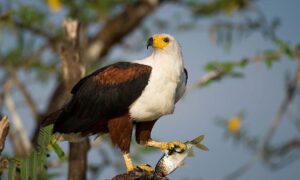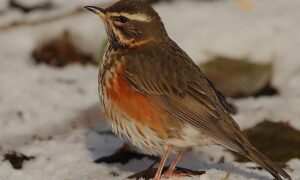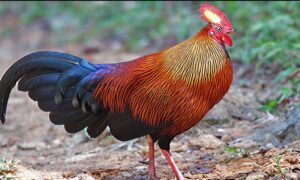The national bird of Finland is Whooper Swan. Whooper were once nesting in much of North America, but quickly disappeared as civilization advanced westward; by 1930, fewer than 100 were left in southern Canada. The national bird of Finland is Whooper Swan protection against hunting and human disturbance, populations have recovered in different parts of the northwest. Recent efforts have focused on reintroducing the species into areas that are considered part of the former breeding area, such as Minnesota, Wisconsin, Michigan, Ohio and Ontario.
Finland National Bird
Habitat Lakes, lagoons, large rivers; in winter, also bays. It prefers large, but shallow, freshwater lagoons, or wide, slow-moving rivers with lots of vegetation. National bird of Finland current range is concentrated in forested regions, although in the past, it was a common species in the northern prairies.
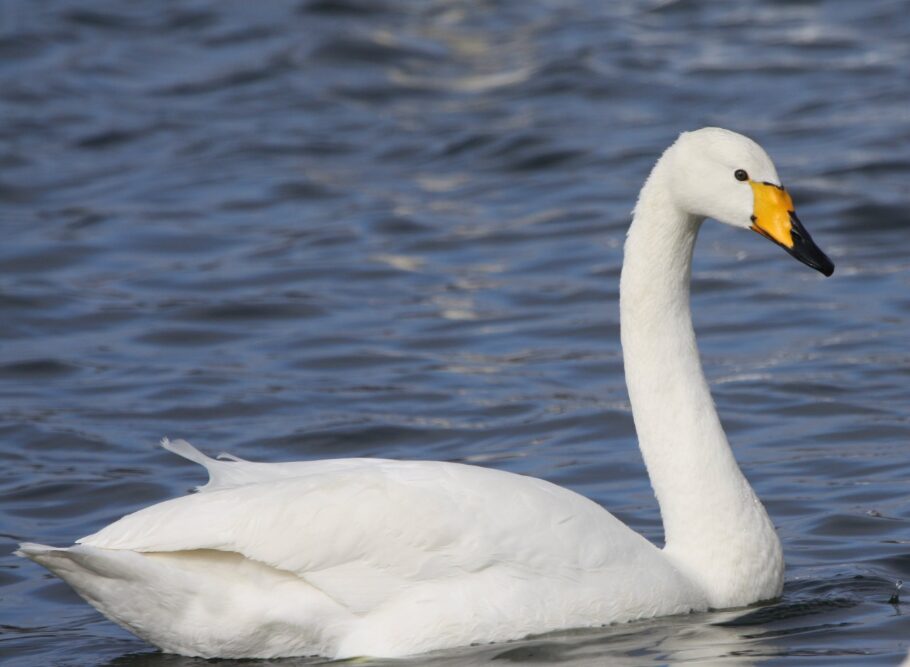
As a largest water bird in North America and one of the heaviest flying birds, the Whooper Swan almost became extinct in the early 20th century. Conservationists believe that their healthy recovery is a victory. Usually, the trumpeter swan is very sensitive to human activity. In protected areas, such as some parks and shelters, you can get accustomed to humans and allow them to approach.
Interesting facts about Whooper swan
Food
Capture food that collects under water or on water surface; Sometimes it traps food on land, especially in winter. To feed in deeper waters, the swans turn the tail upward, with the neck extended downward as they seek food by touching the beak.
Do you know Collared Lory is the national bird of Fiji ?
Eggs
Between 4 and 6, until 9. Blancuzcos, stained by the nest. The female is responsible for much of the incubation process, although the male usually participates; the eggs hatch between 32 and 37 days.
Breeding
Can swim from less than one day old. Both parents take care of the young and take them to feeding sites. The pups cannot fly well until 3 or 4 months after hatching.
[table caption=”Whooper swan Features” width=”500″]
No.,Features,Measures,
1,National Bird,Finland
2,Family,Anatidae
3,Wingspan,205–275 cm (81–108 in)
4,Phylum,Chordate
5,Mass Male, 15.5 kg (34 lb)
6,Mass Female, 15.9 kg (34 lb)
7,Body Length,140–165 cm (55–65 in)
[/table]
Mainly plant material. Adults feed primarily on stems, leaves and roots of aquatic plants, such as reeds, water spikes, brushes, wild celery, barbeque together, spaghetti plants and many others. It can feed on terrestrial herbs and crop waste in winter. The offspring ingest many insects and other small invertebrates, mainly during the first two weeks after hatching.
Nesting
They usually form a couple between 2 and 4 years old, but they nest for the first time between 4 and 7 years of age. They often form a couple and keep it for life. Nest: The site is a floating platform surrounded by water, like a small island or a burrow of beaver or muskrat. The nest (constructed by both sexes, although the female usually does much of the work) is a small mound of plant material several centimeters in diameter, with a depression in the center. The same nest can be used in the following years.
Whooper swan Picture
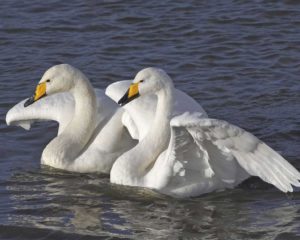
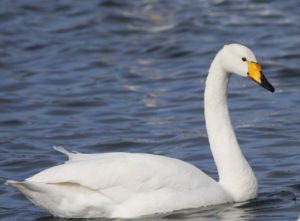
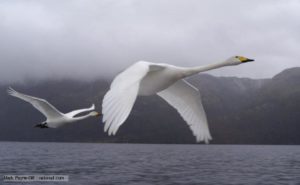
Imprinted Whooper swans following their owners on Loch Lommond, Scotland, UK, during filming for BBC NHU ‘Journey of Life’


